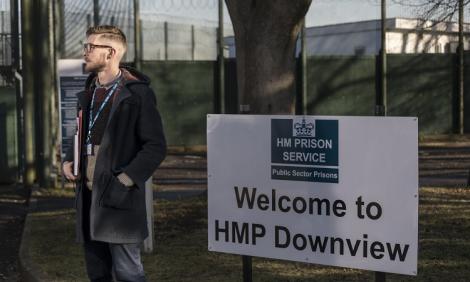Forensic psychologist
Forensic psychologists apply psychological theory to criminal investigation to help understand psychological problems associated with criminal behaviour, and the treatment of those who have committed offences.
They work with all aspects of the criminal justice system.
Working life
Forensic psychologists work with the psychological aspects of investigation, legal process and offending behaviour and apply psychological methods to reduce the impact of this and future re-offending.
You'll work in the treatment of offenders in a range of areas including sexual offending, violence and aggression, interpersonal and social skills and intervention to help stop illicit drug and or alcohol use. You'll offer treatment for those who have committed offences to reduce the impact of their experiences and to reduce chances of reoffending.
Most of your work will be done in association with the police, probation services, prisons, young offender institutions, or secure mental health hospitals.
Your work may include:
- implementing treatment programmes
- reducing stress for staff and offenders in secure settings
- providing research evidence to support psychological practice with offenders
- undertaking statistical analysis for prisoner profiling
- giving expert evidence in court
- advising parole boards and mental health tribunals
- crime analysis
Hon Professor Dr Geraldine Akerman
Consultant forensic psychologist
Read Geraldine's storyI am interested in helping individuals look back at their experiences and see what they need to address for their future well-being and to prevent further offending or harm to others.

Pay and benefits
Most jobs in the NHS are covered by the Agenda for Change (AfC) pay scales. This pay system covers all staff except doctors, dentists and the most senior managers.
After completing your training, you will be paid at band 7. Psychologists in the NHS can work full or part time. Terms and conditions can vary for employers outside the NHS.
You’ll also have access to our generous pension scheme and health service discounts, as well as 27 days of annual leave plus bank holidays.
Who will I work with?
Forensic psychologists work with a range of people, including:
- those who have chronic difficulties
- those at risk of offending as a consequence of their behaviour
- family members
- victims
- the public affected by crime
Whilst this usually applies to adults, some specialised forensic psychologists work with young offenders and within the youth justice system.
Where will I work?
The largest single employer of forensic psychologists in the UK is HM Prison Service, although forensic psychologists are also employed by:
- specialist NHS mental health settings (such as ‘secure hospitals’)
- social services
- offender management services (such as police and probation)
- academic departments, teaching, supervising, and researching in their area of expertise
Entry requirements
You'll usually need a British Psychological Society accredited undergraduate degree in psychology for the Master’s degree in forensic psychology. Experience is also essential when applying to forensic psychology programmes. This can be paid or voluntary and preference is given to those with experience of working in a forensic setting such as within prisons, probation services or a youth offending service.
Training
You'll need to complete a Master’s degree in forensic psychology approved by the Health and Care Professions Council (HCPC). You'll then need to complete one of the following:
- A minimum of three years of evidence supervised practice where the trainee can provide evidence of applying psychology appropriately in forensic practice
- An HCPC-accredited doctoral programme that includes practice placements and a third year research thesis
If you started NHS-funded training from April 2022, you will normally be unable to access further NHS-funded training for a new occupation in the psychological professions until two years after your qualifying exam board.
Visit the funding for psychological professions training programmes web page for more information on NHS funding.
Where the role can take you
Once you have qualified as a psychologist, there are a wide range of opportunities. You could apply for more senior positions, for example consultant psychologist or head of a psychology service. As psychology relies heavily on research, you could contribute to the development of the profession through research work and teaching. You could apply for a trainee high intensity therapist position.
Displaying 1 - 5 of 14 matches
-
Forensic Psychology (Practitioner Programme)
Cardiff Metropolitan University
View courseOpens in a new window
- Qualification
- Postgraduate Diploma - PgDip
- Study mode
- Part-time
- Duration of the course
- 5 Years
- Leading to a career in
- Psychology (forensic)
- Contact details
- [email protected] 029 2041 6010
- Region
- Wales
- Admissions address
- Western Avenue
Cardiff
CF5 2YB
Wales
-
Forensic Psychology (Practitioner Programme)
Cardiff Metropolitan University
View courseOpens in a new window
- Qualification
- Postgraduate Diploma - PgDip
- Study mode
- Full-time
- Duration of the course
- 2 Years
- Leading to a career in
- Psychology (forensic)
- Contact details
- [email protected] 029 2041 6010
- Region
- Wales
- Admissions address
- Western Avenue
Cardiff
CF5 2YB
Wales
-
Forensic Psychology Practice
University of Birmingham
View courseOpens in a new window
- Qualification
- ForenPsyD
- Study mode
- Full-time
- Duration of the course
- 3 Years
- Leading to a career in
- Psychology (forensic)
- Contact details
- [email protected]
- Region
- West Midlands
- Admissions address
- Edgbaston
Birmingham
B15 2TU
England
-
Forensic Psychology Practice
University of Birmingham
View courseOpens in a new window
- Qualification
- ForenPsyD
- Study mode
- Part-time
- Duration of the course
- 4 Years
- Leading to a career in
- Psychology (forensic)
- Contact details
- [email protected]
- Region
- West Midlands
- Admissions address
- Edgbaston
Birmingham
B15 2TU
England
-
Forensic Clinical Psychology
University of Birmingham
View courseOpens in a new window
- Qualification
- ForenPsyD
- Study mode
- Full-time
- Duration of the course
- 4 Years
- Leading to a career in
- Psychology (forensic)
- Contact details
- [email protected]
- Region
- West Midlands
- Admissions address
- Edgbaston
Birmingham
B15 2TU
England
-
Clinical and/or Forensic Psychologist
Manchester, M25 3BL
- Salary :
- £55690.00 to £62682.00
- Type :
- Permanent
- Employer :
- Greater Manchester Mental Health NHSFT
-
Principal Clinical/Counselling/Forensic Psychologist
Dartford, DA2 6PB
- Salary :
- £66653.00 to £77094.00
- Type :
- Permanent
- Employer :
- Kent & Medway NHS & Social Care Partnership Trust
-
Senior Clinical/Forensic Psychologist Part-Time
Thatcham, RG19 8ET
- Salary :
- £57000.00
- Type :
- Permanent
- Employer :
- Elysium Healthcare
-
Highly Specialist Clinical / Counselling / Forensic Psychologist
Oxford, OX4 4XN
- Salary :
- £47810.00 to £62682.00
- Type :
- Permanent
- Employer :
- Oxford Health NHS Trust
-
Clinical or Forensic Psychologist 7-8a
Marston Green, B37 7HH
- Salary :
- £47810.00 to £62682.00
- Type :
- Permanent
- Employer :
- Coventry and Warwickshire Partnership Trust
-
Principal Clinical or Forensic Psychologist x 2
Marston Green, B37 7HH
- Salary :
- £64455.00 to £74896.00
- Type :
- Fixed-Term
- Employer :
- Coventry and Warwickshire Partnership Trust
-
Senior Clinical/Forensic Psychologist and Clinical Lead
Peterborough, PE1 3RW
- Salary :
- £55690.00 to £62682.00
- Type :
- Permanent
- Employer :
- Cambridgeshire and Peterborough NHS Foundation Trust
-
Clinical/Forensic/Counselling Psychologist
Peterborough, PE3 6AN
- Salary :
- £47810.00 to £54710.00
- Type :
- Permanent
- Employer :
- Cambridgeshire and Peterborough NHS Foundation Trust
-
Principal Clinical/Forensic/Counselling Psychologist
Dudley/Walsall, DY1 2LZ
- Salary :
- £64455.00 to £74896.00
- Type :
- Permanent
- Employer :
- Black Country Healthcare NHS Foundation Trust
-
Senior Clinical/Forensic/Counselling Psychologist
Brixton, SW9 9SP
- Salary :
- £64156.00 to £71148.00
- Type :
- Permanent
- Employer :
- South London and Maudsley NHS Foundation Trust
-
Forensic Psychologist in Training- Maternity cover up to 1 year
Milton Keynes, MK6 5LS
- Salary :
- £29969.00
- Type :
- Permanent
- Employer :
- Elysium Healthcare
-
Clinical/Forensic/Counselling Psychologist OPD Pathway - SOLAR Service
Boston, PE22 0QX
- Salary :
- £55690.00 to £62682.00
- Type :
- Permanent
- Employer :
- Nottinghamshire Healthcare NHS Foundation Trust
-
Forensic Healthcare Professional - Worcester
Worcester, WR1 3QX
- Salary :
- £41190.24
- Type :
- Permanent
- Employer :
- Partnering Health Ltd
-
Consultant in Forensic Psychiatry
Conwy, LL30 1LA
- Salary :
- £91722.00 to £119079.00
- Type :
- Permanent
- Employer :
- Betsi Cadwaladr University Health Board
-
Consultant in Forensic CAMHS
Southampton, SO40 2RZ
- Salary :
- £109725.00 to £145478.00
- Type :
- Permanent
- Employer :
- Hampshire and Isle of Wight Healthcare NHS Foundation Trust
-
Consultant in Forensic Psychiatry - Ravenswood
Fareham, PO17 5NA
- Salary :
- £109725.00 to £145478.00
- Type :
- Permanent
- Employer :
- Hampshire and Isle of Wight Healthcare NHS Foundation Trust
-
Principal Occupational Therapist/Forensic AHP Lead
Willerby, HU10 6ED
- Salary :
- £55690.00 to £62682.00
- Type :
- Permanent
- Employer :
- Humber Teaching NHS Foundation Trust
-
Psychologist
Kings Lynn, PE30 5PD
- Salary :
- £47810.00 to £62682.00
- Type :
- Permanent
- Employer :
- Norfolk & Suffolk Foundation NHS Trust
-
Psychologist
Scunthorpe, DN16 1AL
- Salary :
- £64455.00 to £74896.00
- Type :
- Permanent
- Employer :
- Rotherham Doncaster and South Humber NHSFT
-
Consultant Forensic Psych (Whitlingham)*Generous Recruitment Package*
Norwich, NR6 5BE
- Salary :
- £109725.00 to £145478.00
- Type :
- Permanent
- Employer :
- Norfolk & Suffolk Foundation NHS Trust
-
Consultant in Forensic Psychiatry - Southfield Low Secure
Southampton, SO40 2RZ
- Salary :
- £105504.00 to £139882.00
- Type :
- Permanent
- Employer :
- Hampshire and Isle of Wight Healthcare NHS Foundation Trust
-
8a - Clinical Psychologist/Counselling Psychologist - Bristol
Bristol, BS5 7TJ
- Salary :
- £55690.00 to £62682.00
- Type :
- Permanent
- Employer :
- Avon & Wiltshire Mental Health Partnership NHS Trust
-
Clinical Psychologist
Keele, ST5 5NT
- Salary :
- £46148.00 to £60504.00
- Type :
- Permanent
- Employer :
- Caudwell Children
-
Senior Psychologist
Preston, PR1 5AB
- Salary :
- £53000.00 to £63000.00
- Type :
- Permanent
- Employer :
- Practice Plus Group
-
Qualified Psychologist
Yorkshire and Humber, HD6 3EL
- Salary :
- £50000.00 to £52000.00
- Type :
- Permanent
- Employer :
- Cygnet Health Care
-
Principal Psychologist
Stoke-on-Trent, ST4 6QG
- Salary :
- £64455.00 to £74896.00
- Type :
- Permanent
- Employer :
- North Staffordshire Combined Healthcare Trust
Showing 6 of 26 results





